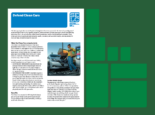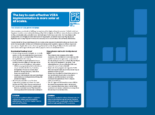2024 Virginia General Assembly
What are the environmental priorities?
Virginia’s General Assembly is now in session. Beginning January 10, 2024, and expected to end March 9, 2024, this is the time when legislators gather in Richmond to introduce and pass new laws and to adopt a new state budget. The provisions that are ultimately adopted—or that fail to be adopted—have an enormous impact on all Virginians and on our environment. During the legislative session, SELC is in Richmond, on the ground, working alongside partners and communities to ensure the best outcomes for all of the state’s residents.
Ensuring Virginia’s Clean Energy Transition
Over the past few years, Virginia has become a leader in the South for its bold adoption of the Virginia Clean Economy Act (VCEA) and the Clean Energy and Community Flood Preparedness Act in 2020, which required the state to join the Regional Greenhouse Gas Initiative (RGGI), and its adoption of Clean Cars Standards in 2021.
Virginia Clean Economy Act
The VCEA is Virginia’s path to a zero-carbon electricity grid by 2050. Among other things, it requires Dominion Energy and Appalachian Power (APCo) to retire all their existing fossil fuel plants by 2045, establishes energy efficiency savings requirements for Dominion, APCo, and Old Dominion Power, and dramatically raises the cap on residential (rooftop) solar from 1% of the utility’s previous year’s load to 6%. During this year’s session, we are seeking to build on the already robust mandates in the VCEA.
Clean Cars Standards
The Clean Cars Standards are one of the most important tools we have to curb tailpipe pollution. Yet each year since their adoption, Governor Youngkin and some Virginia lawmakers have tried to repeal these standards, which the state adopted in 2021. Under the federal Clean Air Act, states can follow either the federal tailpipe emissions standards or more protective standards California is authorized to develop. Adopting California’s standards is the only way states can have tailpipe standards that are stronger than the federal baseline and Virginia residents have been supportive of the state adopting these more protective standards. Bills to abandon these efforts have already been introduced for the 2024 session, and misinformation is increasing Pollution from transportation remains the leading source of carbon pollution in the state and nation, and reducing it plays a critical part in our clean energy transition.
VCEA, Clean Cars Standards, and RGGI can all work together keep Virginia at the forefront of what a clean energy future looks like. The General Assembly needs to provide all Virginians a chance to thrive and to access clean water, air, and transportation for generations to come.
Trip Pollard, Senior attorney and leader of SELC’s Land and Community Program
Regional Greenhouse Gas Initiative
Last June the state Air Pollution Control Board voted to withdraw Virginia from RGGI. This move prompted SELC to challenge the action, stating in a lawsuit filed in August that the Air Pollution Control Board, the Virginia Department of Environmental Quality, and its director Michael Rolband, do not have the authority to end the state’s participation in the successful carbon trading program. The case is currently pending in Floyd, Virginia.
Protecting Virginia’s Wetlands
The Commonwealth recognized the critical importance of Virginia’s wetlands in 2000, when the Nontidal Wetlands Act was passed by a bipartisan majority in the General Assembly and signed into law by then-Governor Jim Gilmore. Additionally, Virginia’s State Water Control Law, Tidal Wetlands Act, Chesapeake Bay Preservation Act, and other laws work together to keep intact the valuable wetlands we depend on for clean drinking water, flood protection, fish and wildlife habitat, and more. Now, we want to be sure that these longstanding and critical state protections are maintained as threats to clean water increase.
Take Action
Small modular nuclear reactors are uncharted territory for Virginia. This is why we want to draw your attention to Senate Bill 454 and House Bill 1491, which would allow Appalachian Power and Dominion Energy to recover development and site preparation costs (plus profits) for SMR power plants from their customers.
This bill removes existing customer protections to provide preferential treatment to SMRs—a technology that is completely unproven for commercial electricity generation. There are currently no operational SMRs delivering electricity to the United States grid, and the leading proposal in the country was recently cancelled. Southern utilities have a poor track record of wasteful attempts at nuclear power plants. Virginia utilities should stay focused on expanding proven clean energy resources.
For these reasons and many more, we encourage you to act and tell your legislator to vote NO. Act now with Appalachian Voices.
Additional Resources

Defend Clean Cars

RGGI is the Law in Virginia

Protect Virginia’s Wetlands

The State of Solar in Virginia

Driving Down Pollution
Real people, real solutions
Learn how Virginians are embracing policies designed to fight climate change and break down barriers.

